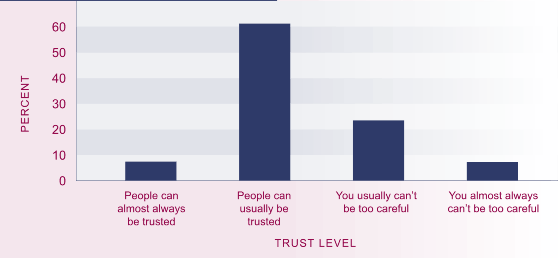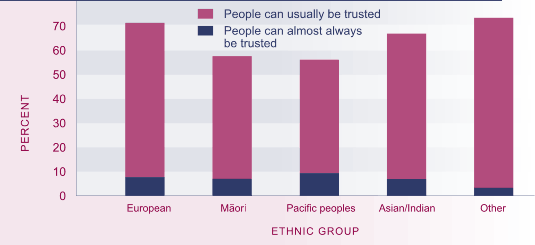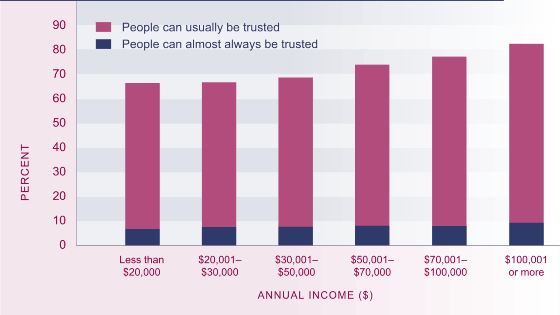Trust in others
Definition
The proportion of the population aged 15 and over reporting that people can "almost always" or "usually" be trusted, as reported in the Quality of Life in New Zealand 's Largest Cities Survey 2004.
Relevance
Trust in others is an important indicator of how people feel about members of their community. High levels of trust facilitate co-operative behaviour among people and contribute to people's ability to develop positive relationships with others.
Current level
In 2004, 69 percent of New Zealanders said they believed people can be trusted, with 8 percent reporting "people can almost always be trusted" and 61 percent reporting "people can usually be trusted".
Figure SC3.1 Levels of trust in other people, 2004

Source: Auckland City Council et al (2005) Quality of Life in New Zealand's Largest Cities
Sex and age differences
The proportion of those reporting that people can be trusted was the same for both males and females, at 69 percent. Eight percent of females and 7 percent of males support the statement "people can almost always be trusted". Both sexes have the same proportion of supporters (61 percent) for the statement "people can usually be trusted".
Levels of trust ranged from 65 percent at ages 15–24 years to 70 percent at 25–49 years.
Ethnic differences
People in the "Other" ethnic group reported the highest overall level of trust in others with 73 percent responding that people could "almost always" or "usually" be trusted, followed by European at 71 percent and Asian/Indians at 66 percent. Māori (57 percent) and Pacific peoples (56 percent) had the lowest proportions who felt that people could be trusted.
Figure SC3.2 Proportion of respondents reporting that people can "almost always" or "usually" be trusted, by ethnic group, 2004

Source: Auckland City Council et al (2005) Quality of Life in New Zealand's Largest Cities
Personal income differences
Across all income levels a majority of New Zealanders indicated that people could "almost always" or "usually" be trusted. Trust in others tends to increase as personal income levels increase. New Zealanders with personal incomes over $100,001 reported the highest overall levels of trust (82 percent). Those with incomes of $30,000 or less reported lower levels of trust overall, with only 66 percent indicating that they thought people could be trusted "almost always" or "usually".
Figure SC3.3 Proportion of respondents reporting that people can "almost always" or "usually" be trusted, by personal income, 2004

Source: Auckland City Council et al (2005) Quality of Life in New Zealand's Largest Cities
Regional differences
Across all Big Cities a majority of New Zealanders indicated people could "almost always" or "usually" be trusted. Those living in Wellington reported the highest levels of trust, with 78 percent indicating people could be trusted "almost always" or "usually". Those living in Manukau reported the lowest level of trust in others, with 61 percent reporting people could "almost always" or "usually" be trusted.
International comparison
In 1998, 49 percent of New Zealanders said most people can be trusted. This was high compared to an OECD median of 38 percent in 1995/1996. New Zealand ranked sixth out of 26 OECD countries. Norway had the best outcome in the OECD, with 65 percent of Norwegians stating most people can be trusted. Outcomes for other countries include Canada at fifth, with 52 percent, Australia at 13th, with 40 percent, the United States at 14th, with 36 percent, and the United Kingdom at 18th, with 31 percent. 91
|



